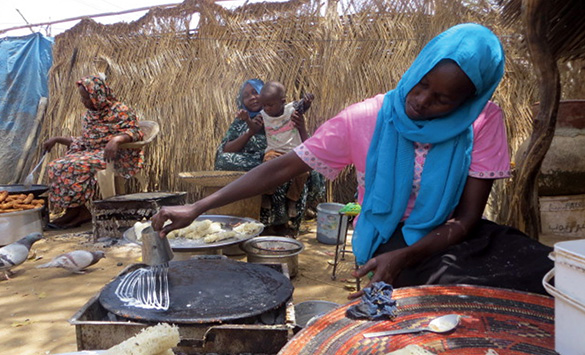DARFUR — Regional violence forced Nawal Al Sanowsi, a mother of four, to flee her village. At the time, she never could have imagined it would lead to her becoming a successful restaurant owner. But that is what happened, and today her business is thriving with an average daily income of US$26.
Nawal’s success began with tragedy. Separated from her husband, she arrived in the Central Darfur town of Zalingei as the sole breadwinner of her household. Her precarious situation led to her selection by community leaders for a USAID-OFDA funded project that emphasizes the inclusion of women, internally displaced people (IDPs), and youth in activities supporting early recovery efforts in Darfur.
Near East Foundation beneficiaries like Nawal participate in training workshops that help people start or expand income-generating activities. To date, 2,330 beneficiaries have received such business training in 58 workshops held in eight village clusters in Darfur. Basic marketing and financial management are among the key topics covered. These concepts assist beneficiaries to assess what factors contribute to the success or failure of their respective enterprises. An important resource for women in Darfur, they make up approximately 54 percent of the workshop participants.
Nawal used a $230 business start-up grant to open a restaurant and three months later, it is flourishing. Sharing her newfound success, she hired two women as assistants. Halima and Amina, also IDPs and the sole breadwinners in their respective households, we trained in pastry making and help with Nawal’s business.
“At first, I sold around two kilos of pastries a day, but now that’s increased to 8 kilos with customers buying them up quickly,” she says of her pastries, a customer favorite. Nawal now earns enough to take care of her family and even plan for the future. Business is so good she is moving to an even better, busier location with greater potential for client base expansion. Though monthly rent for the new location is $105, Nawal feels her income will allow her business to expand without undue risk.
Khadoj Abdullah is another success story. An orphan responsible for her seven younger siblings, she is an up-and-coming business owner who benefitted from business acumen acquired at NEF workshops. Trading in sorghum and millet, locally produced grains, Khadoj created a niche for herself with the unique way she processes millet, which is very popular among her growing clientele. She also profited by skillfully anticipating her customers’ needs during the holy month of Ramadan, supplying them with certain types of chickpeas much sought after during that time. With her increased revenue, Khadoj can now pay for her younger siblings’ school tuition.
Nawal and Khadoj are delighted with their turns of fortune and credit the assistance provided by the Near East Foundation for helping them gain financial and social empowerment.
To learn more about NEF’s work in Sudan, Click Here



